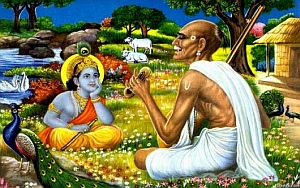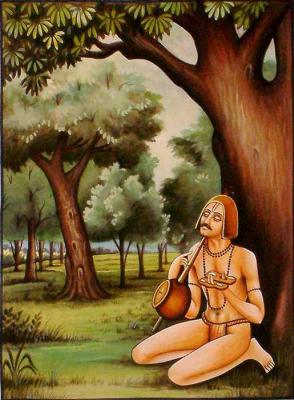 Surdas (Sant Kavi Surdas) was a 15th century blind saint, poet and musician, known for his devotional songs dedicated to Lord Krishna. Surdas is said to have written and composed a hundred thousand songs in his magnum opus the ‘Sur Sagar’ (Ocean of Melody), out of which only about 8,000 are extant. He is considered a saint and so also known as Sant Surdas, a name which literally means the “slave of melody“.
Surdas (Sant Kavi Surdas) was a 15th century blind saint, poet and musician, known for his devotional songs dedicated to Lord Krishna. Surdas is said to have written and composed a hundred thousand songs in his magnum opus the ‘Sur Sagar’ (Ocean of Melody), out of which only about 8,000 are extant. He is considered a saint and so also known as Sant Surdas, a name which literally means the “slave of melody“.

Surdas, Blind Poet of Gokulum
1479 – 1584
Origins
Sura-dasa is known as Suradasa, or Surdas. Sura means “a blind man”; dasa variously means slave of, servant, but more popularly, servant of the Lord, “dasa” being understood as servant of, instrument of; in devotion, one of the nine forms of devotion is sneham, friendship with the Lord; dasa in this instance indicates Divine intimacy.) Similar names abound: Ram-das (dasa of Lord Rama) Krishna Das (dasa of Krishna). so to be clear shall refer to him as Sura. His birth name is actually unknown. In his poetry, he called himself dasa-Sura, implying he was the servant of Lord Krishna.
Sura is said to have been born in Agra, circa 1479; it is debated whether or not vision was denied to him in birth and that he was granted similar vision to that which Sanjaya enjoyed in the Bhagavad Gita, where Sanjaya is narrating incidents and events hundreds of miles away to the Blind king Dritharastha. Recent exegesis of the poetry of Surdas indicates he may have lost his vision around the age of 16. Other sources cite a poem (pada) wherein Sura states he only has one good eye, and vision was defective in that eye, also. There are exegetical problems with this as many later redactors and poets attributed poems to Sura which he never wrote; thus, statements about Sura in poems are taken as a gloss.
Redaction criticism concludes that although he lived at Brindavan, and poems are attributed to Sura describing the beauty of Brindavan, in all probability, Sura never saw Brindavan and he was totally blind when he was middle aged.
It is said that Sura lived as a hermit at Gaughata, Uttar Pradesh, circa 1478-1584 and it was there he met the sage Vallabhacharya. Vallabha at that time was married (marriage occurred in 1503 or 1504), so we may take that era as time for the meeting. Sura is also said to have met with Vitthalanatha, another saint, who lived in Gokula, (Brindavan in Mathura, an area associated with Krishna). It is also said that the Emperor Akbar issued two orders in relation to Sura; he was permitted to reside and be “undisturbed without fear” (in other words free from persecution) and the second order, given in 1581, allow Sura to graze cows and tend to cows, a formidable concession given during a time when Muslims were ritually slaughtering cows. The blind Sura must have made a significant impression on Akbar. During the times of Sura, Sultanate rule was in place. There were years of various rulers, short and uncertain. The rulers themselves were changeable, capricious and unpredictable. Akbar was an exception to the rule, having investigated other religions in his youth, and more importantly, Akbar was a vegetarian. He said his stomach “was not a graveyard for animals”.
Works of Surdas
There are three main works attributed to Sura; the Surasagara (literally, ocean of poems), Surasalavali, and Sahityalahari. The source of Sura’s works are principally the Bhagavatha, the epic narrative of divinity and the sports of the Divine Krishna. He also composed works on other subjects such as the Rama story, maya, mythological legends and the like. However, the main thrust of Sura’s poetry was on Radha, Krishna and the gopis, (cowherd girls of Brindavan). Sura mainly used the pada form of Hindi verse, although there are examples of dohas (couplets) and narrative songs, also. Saints all over India used to sing devotional songs in pada form, and Sura called himself a dadhi, (minstrel or bard) singing of Radha and Krishna. The padas came to his mind spontaneously. There are no laboured compositions, indicating the quality and power of the gift that Sura possessed.
The goal of life is illuminated in what is called the purusarthas, the four great goals or aims in life: wealth (artha), desire (kama), living with right conduct (dharma) and union with God (moksha). These goals have to be pursued and aimed for with balance, equanimity. A tyre inflated too much bursts. Too much energy focussed on one goal of life at the expense of the other goals leads to a lack of balance and being consumed by activity, desire or ahamkara, the tyranny of the ego. We are not led by our feelings, desires, the senses nor the mind. The mind has to be under good management, informed by dharma (right conduct) and vairagya, discrimination. We are led by atma-balan, strength of spirit, not the mind. Here, Sura chides his listeners not to fall prey to the mind and its furnace of desires, which can never be quenched:
Foolish Mind
Shameless, errant, wicked mind
right up to the end of life
you set your heart on carnal delights
as a diseased black dog, tailless,
lame, misshapen; round his neck
a broken pot; pursuing a bitch
The goat frolics and grazes, while by it
the butcher sharpens the knife’s blade
to hack its head off. Day by day
the body wastes, while you look on
Says Suradasa, I can’t understand
what makes a chaste wife
bed another man!
Awake, O Mind, Awake!
O foolish mind awake
even now;
you let the years go waste
your black hair have turned grey;
serve the Lord with firm resolve
before it is too late
Says Suradasa, do not lose yourself
in this world’s worldliness; Remember God.
The only solution, the only purpose of life is union with God (what is called moksha, salvation). Moksha is attained by drawing the mind constantly back to the Divine, reciting or chanting the name of the Lord, a spiritual discipline called namasmarana (repeating the Lord’s name) sometimes done with japa (rosary beads). Each individual life is a bubble on the ocean of divinity, the bubble emerges, bursts and returns to the ocean. Better to be immersed in the ocean than to be caught up by the mind and desires. We are each individually born with an invisible chain around our necks, called the garland of Brahma (the Creator) which determines the number of breaths we shall take in this lifetime. Across our brows are lines; these are called the lines of prarabdha karma, lines writ by ourselves. The teaching is that the birth is caused by unfulfilled desires and karmas of previous lives. Thus are we born to fulfil what we have writ ourselves: See how pithily Sura captures all this in the following poem:
Devotion to God is the only way to salvation
Chant the name of Krishna awhile
for maya, delusion and greed pursue
you and death waits for you.
Existence on this earth
is like a bubble that bursts
in the air,
and even dogs and crows
will not care
to feed on your body
when live goes.
If you do not believe me
open the book
which records your karmas and look:
wandering through many worlds you have come
and may now regret what you have done;
but what is writ is writ
not a word of it
can be erased,
and all the ten doors of the senses
close with old age.
Says Suradasa only devotion to Krishna
can wipe out your accumulated sins.
![]()

